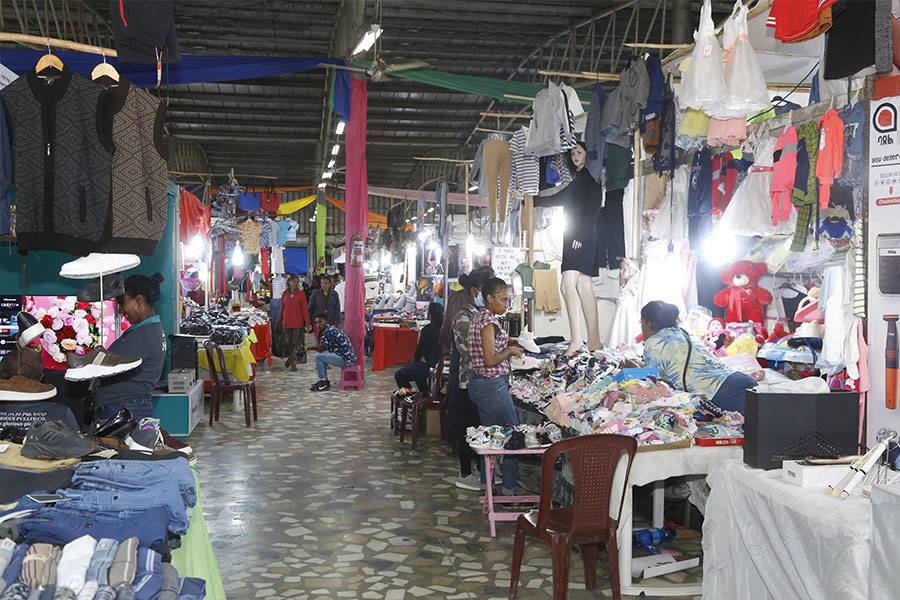
Featured | Jan 01,2023
A series of discussion panels were summoned a couple of weeks ago at the Ministry of Finance headquarters on King George Street (Sidist Kilo), with hopes of engaging the relevant stakeholders on the impending value-added tax (VAT) proclamation.
The legal experts drawn from the finance and revenue ministries have been preparing a draft bill to replace the 20-year-old proclamation since last year and released the first draft for comment in August. However, it was unclear to several stakeholders prompting the Ministry of Finance to hold a discussion.
The Ministry announced the meeting dates and schedules on its official website a couple of weeks in advance, dividing the concerned sectors [telecom, agriculture, finance, construction, transportation, education, hospitality, trade, manufacturing, mines and tourism] into eight groups for a week-long engagement.
However, each meeting saw less than a dozen people in attendance while investors in the construction and real-estate businesses were a no-show, leading to the cancellation of the event. The sentiment reads there should have been an official invite through associations or institutions instead of just posting an announcement.
"Searching for plastered announcements is not part of our job," one stakeholder told Fortune.
The proclamation scheduled to be in operation for the next budget year beginning in August, ushers in a 15pc VAT on previously exempt services such as ATM transactions, taxi-hailing, delivery and telecom services.
A person is compelled to register for VAT if the supply of goods and services is estimated to be north of two million Birr by the Tax Authority or if the provision of services exceeds the amount.
Habtamu Tadesse is the major shareholder and CEO of Zayride, the first taxi-hailing service company in Ethiopia which has been in operation for the better part of a decade. He believes if a 15pc tax is added on every trip the burden will fall on customers rather than the companies.
Taxi-hailing companies cater to the demand of citizens who are short on viable transportation options, according to Habtamu. He said the manner in which the tax will be levied significantly impacts the cost of trips further exacerbated by the rising cost of fuel.
He has reservations about the planned expansion of the tax base, considering the current headline inflation.
"It's untimely and discouraging to the mass," Habtamu told Fortune.
All the while the provision of public transport services is still exempted from VAT obligations, Habtamu remarked that even a government employee with an average income of 3,000 Br might use a taxi-hailing service once a month, which nullifies the concept of contained inflation.
Abraham Rega, legal advisor at the Ministry of Finance argues the expanded tax base is targeted and considers the economic makeup of citizens. He explained that the commission fee of about 12pc normally charged by the taxi-hailing companies was exempt while it should have been taxed.
Delivery companies are not spared from taxation either as tripartite transactions between a customer, an electronic service provider and the person who physically provides the service fall under the VAT proclamation draft.
Yoseph Hailu is the marketing manager at Zmall Delivery, an online business launched in the early days of the COVID-19 pandemic. The company offers its services through a grocery shopping and food delivery application, partnering with close to 150 supermarkets, suppliers and shops. It charges between 60-450 Br depending on the distance.
Yoseph said the addition of 15pc VAT on transactions will exacerbate the already falling demand for digital delivery businesses.
"Inflation has already eaten a chunk of the demand," he told Fortune.
The legal expert at the Ministry is firm on whether companies that offer electronic services should pay taxes for their services.
The new batch of taxed services will also include online media content revenue and consultancy fees from businesses located outside the country. Abraham mentioned how many government and private institutions use Oracle, a Silicon Valley company owned by billionaire Lary Ellison that provides online database solutions, while no tax gains are made to the country.
"Keeping up with rapid digitization includes up-to-date taxation," Abraham told Fortune.
VAT averages around 21pc of annual taxes. Close to 336 billion Br was collected in taxes within the previous fiscal year of which 58pc was from domestic taxes while the rest falls under revenue from customs.
The new proclamation is in line with Abiy Ahmed's (PhD) Administration's goal of broadening its tax base, aiming for an 18.2pc tax to GDP ratio in five years.
According to Abraham, a four-year study along with a six-month consultation period with tax experts from the dozen tax bureaus was factored into the production of the proposed proclamation.
While the tax proclamation draft has to make its rounds at the Ministry of Justice, a broadened VAT tax base by the next fiscal year is inevitable.
The legal advisor said the Ministry expects that inflation will decrease rendering less brunt the possible economic blow of the proposed tax reforms. The service sector contributed 40pc of the national GDP in 2021/22 according to data from the central bank which was a 7.6pc growth from the previous year.
Financial services aside from deposits and loans will also cease to be exempt if the proposed proclamation passes in its current form.
Desalegn Fishatsion, director of finance at Berhan Bank S.C., finds the imposition of VAT on the multitude of services provided by banks to be "impractical and inconvenient".
"It was absolutely shocking," he told Fortune.
Desalegn said a lengthy preparation period will be required to increase the technological capacity of banks if they are going to somehow calculate VAT upon each transaction. Executing massive transactions while billing VAT to customers is going to worsen the already slow retail banking sector, according to the finance director.
He is eagerly awaiting any accompanying regulations or directives that are going to shed light on the collection mechanism.
Alemayehu Geda (Prof.), a tenured economics researcher from Addis Abeba University, questions the initial assessment upon which aspirations of broadening the tax base are predicated on.
He said society can not handle any more inflation in reference to any added cost to consumers' goods and services.
The professor said most GDP estimations by local governments have been exaggerated at the very least. He recalled the double-digit growth era during the previous regime to which he and his team had contrary results of about a six percent GDP growth.
"Comparing tax contributions to an overstated GDP will inevitably give a small percentage," Alemayehu remarked.
According to him, it is only employees who pay taxes properly, regarding the sizeable contribution of the public sector to the GDP that clouds the contribution of the taxable and taxed private sector.
He recommends an emphasis towards tax collection efficiency than merely taxing more goods and services.
Experts that took part in the proposed tax proclamation were longing to engage with the relevant stakeholders. One of the main advisors, Wasihun Abate, was present all week at the panel discussion.
While Wasihun conceded that the new taxes might serve as inflationary in some sectors, sticking to a two-decade-old proclamation was not optional. However, he acknowledged that the collection of taxes by the Ministry of Revenues could become a source of frustration without the necessary upgrades to the system.
He had expressed during one of the panel discussions last week that items like vegetables which are considered basic necessities would likely be exempted. The senior advisor to the Ministry of Finance who is not new to policy refurbishments by successive administrations suggested that further exemptions will continue to be considered if deemed necessary.
The incorporation of digital tax collection schemes employed by the Ministry of Revenues is indicative of a positive slope to increase tax collection efficiency, according to Wasihun.
"Improvement has to be comprehensive," he said.
For him, the low tax-to-GDP ratio of Ethiopia indicates the importance of broadening the tax base. While it is true that the tax-to-GDP ratio of is below 10pc, questions on whether or not public spending can soothe the development ails of the country remain in the air.
Ethiopia does have a low to tax to GDP ratio below 10pc but it also has a debt-to-GDP ratio of nearly 50pc.
Data from the central bank suggests that the government's share of total expenditure in the previous fiscal year accounted for 7.4pc of the total, excluding the new loans or debt servicing payments. Eurobond issued by the government of Ethiopia to build industrial parks in 2014 also reaches its maturity date in 2024 with a principal payment of a billion dollars.
Several research papers have been conducted analyzing the role of public spending in fostering growth with some focusing on determinants of the quality or efficiency of government spending.
The quality of government spending is determined by a host of social and anthropological factors, such as corruption, ethnic heterogeneity and state capacity. A study conducted by IMF in 2000 concluded that the level of quality in public spending is negatively correlated with higher heterogeneity.
This is not because heterogeneity is negative by itself but rather because "polarized societies will be more prone to competitive rent-seeking and have difficulty agreeing on public goods like infrastructure, education and good policies.
PUBLISHED ON
Mar 11,2023 [ VOL
23 , NO
1193]

Featured | Jan 01,2023

Agenda | Apr 16,2022

My Opinion | Jul 18,2021

Fortune News | Aug 05,2023

Radar | Feb 12,2022

Fortune News | Apr 13,2024

Radar | Feb 04,2023

Radar | Nov 24,2024

Radar | Jul 21,2024

Fortune News | Sep 07,2025

Dec 22 , 2024 . By TIZITA SHEWAFERAW
Charged with transforming colossal state-owned enterprises into modern and competitiv...

Aug 18 , 2024 . By AKSAH ITALO
Although predictable Yonas Zerihun's job in the ride-hailing service is not immune to...

Jul 28 , 2024 . By TIZITA SHEWAFERAW
Unhabitual, perhaps too many, Samuel Gebreyohannes, 38, used to occasionally enjoy a couple of beers at breakfast. However, he recently swit...

Jul 13 , 2024 . By AKSAH ITALO
Investors who rely on tractors, trucks, and field vehicles for commuting, transporting commodities, and f...

Oct 18 , 2025
The political establishment, notably the ruling party and its top brass, has become p...

Oct 11 , 2025
Ladislas Farago, a roving Associated Press (AP) correspondent, arrived in Ethiopia in...

Oct 4 , 2025
Eyob Tekalegn (PhD) had been in the Governor's chair for only weeks when, on Septembe...

Sep 27 , 2025
Four years into an experiment with “shock therapy” in education, the national moo...